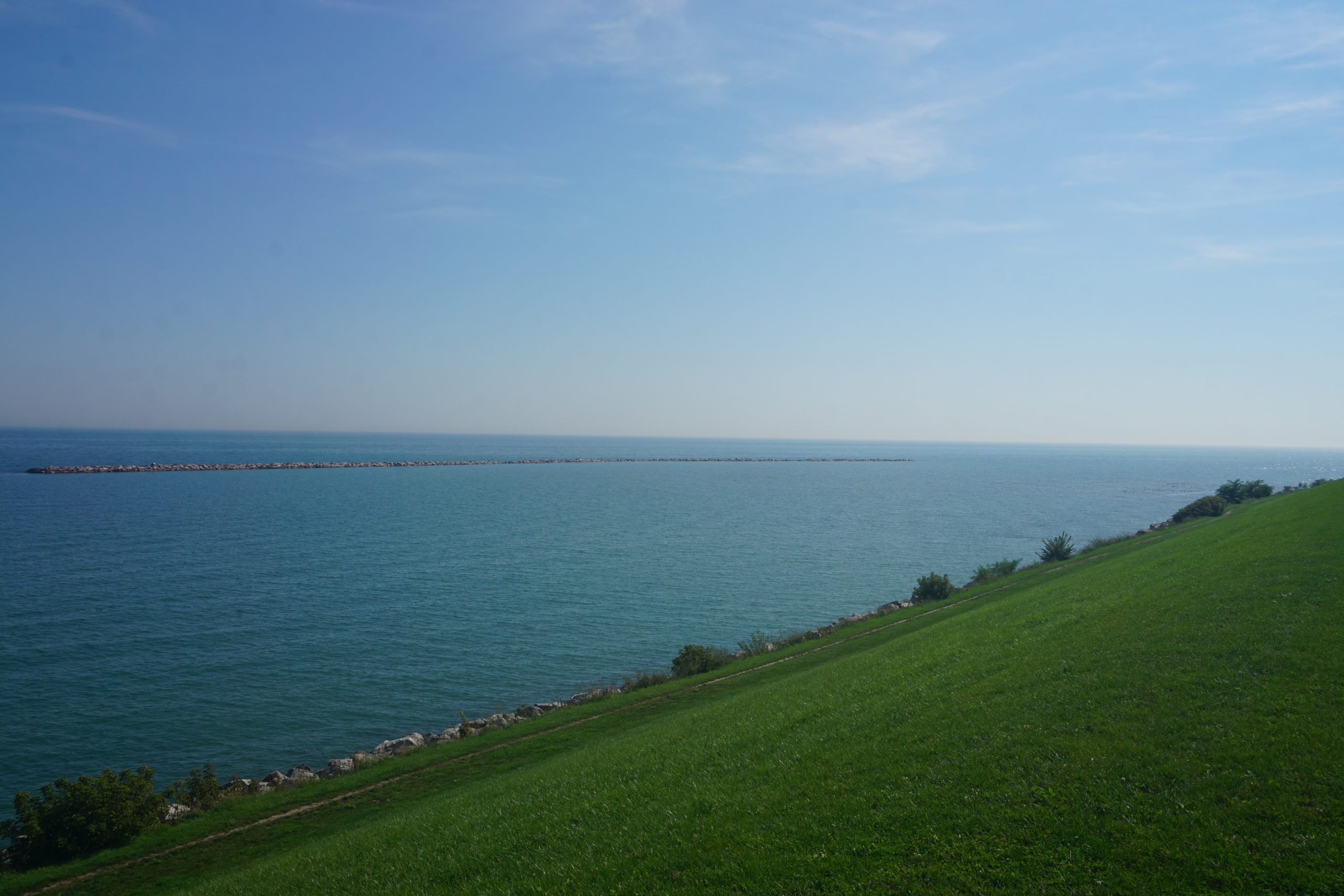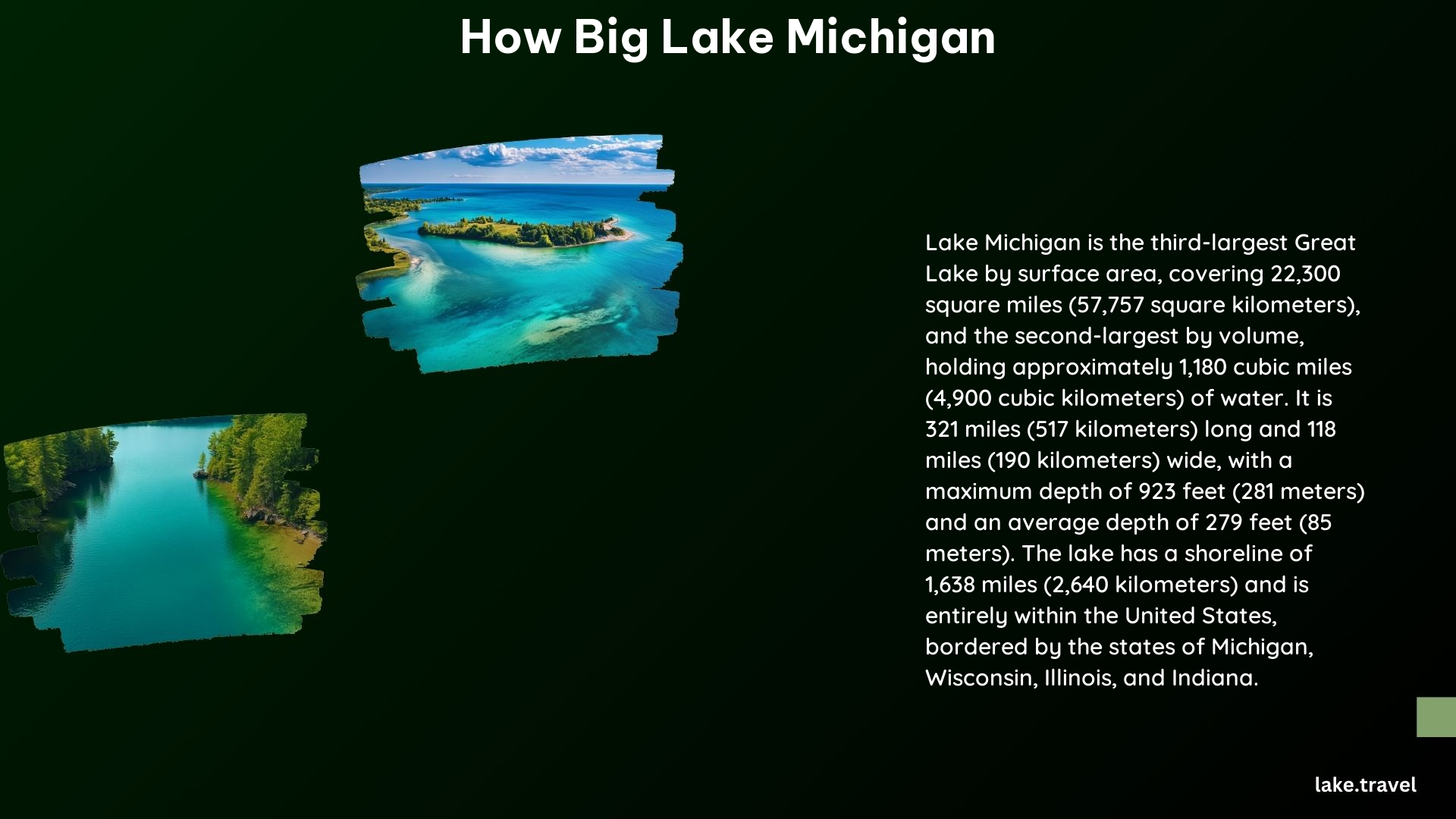Lake Michigan is the second-largest of the Great Lakes by volume and the third-largest by surface area. It is an impressive body of water that spans across multiple states and offers a wealth of recreational opportunities. In this blog post, we’ll dive deep into the specifics of Lake Michigan’s size and explore why it’s such a significant natural wonder.
The Dimensions of Lake Michigan

Lake Michigan’s impressive size can be broken down into several key measurements:
Length
Lake Michigan is approximately 307 miles (494 km) long, stretching from the northern tip of the Lower Peninsula of Michigan to the southern end of the lake.
Width
On average, Lake Michigan is 75 miles (118 km) across, though its width can vary significantly depending on the location.
Surface Area
With a surface area of 22,300 square miles (57,800 km²), Lake Michigan is the largest freshwater lake entirely within one country (the United States) and the fifth-largest lake in the world by surface area.
Volume
The lake contains approximately 1,180 cubic miles (4,900 km³) of water, making it the second-largest of the Great Lakes by volume.
Maximum Depth
The deepest point in Lake Michigan is 925 feet (282 meters), located in the northern part of the lake.
Shoreline
Lake Michigan has a total shoreline of approximately 1,640 miles (2,640 km), stretching across the states of Michigan, Illinois, Indiana, and Wisconsin.
The Significance of Lake Michigan’s Size

Lake Michigan’s impressive size has a significant impact on the surrounding region and the people who live, work, and play near its shores. Here are some of the key ways that the lake’s size influences the area:
Ecosystem and Wildlife
The vast size of Lake Michigan supports a diverse and thriving ecosystem, with a wide variety of fish, birds, and other wildlife calling the lake and its surrounding habitats home. The lake’s size and depth also play a crucial role in regulating the local climate and weather patterns.
Recreation and Tourism
With its expansive shoreline and deep, clear waters, Lake Michigan is a popular destination for a wide range of recreational activities, including boating, fishing, swimming, and beach-going. The lake’s size and accessibility make it a major draw for tourists from across the region and beyond.
Transportation and Commerce
Lake Michigan’s size and location have made it an important hub for transportation and commerce, with major ports and shipping routes connecting the region to the rest of the Great Lakes and the world beyond. The lake’s size and depth also allow for the movement of large cargo ships and other vessels.
Freshwater Resources
As one of the Great Lakes, Lake Michigan is a vital source of freshwater for the surrounding region, providing drinking water, irrigation, and other essential resources for millions of people.
Exploring the Vastness of Lake Michigan
Given the sheer size of Lake Michigan, it’s no surprise that there is so much to explore and discover along its shores and on its waters. Whether you’re a seasoned boater, an avid angler, or simply someone who loves to soak up the natural beauty of the great outdoors, Lake Michigan offers endless opportunities for adventure and exploration.
One of the best ways to experience the vastness of Lake Michigan is to take a boat tour or charter a sailing expedition. From the bustling harbors of Chicago to the serene beaches of the Upper Peninsula, the lake’s shoreline is dotted with charming coastal towns and picturesque natural landscapes that are best experienced from the water.
For those who prefer to keep their feet on dry land, there are countless hiking trails, scenic overlooks, and beachfront parks that offer stunning views of the lake and its surroundings. Many of these destinations also provide opportunities for birdwatching, wildlife viewing, and other outdoor activities.
Conclusion
Lake Michigan is a truly remarkable natural wonder, with its impressive size and depth making it a vital resource for the surrounding region and a beloved destination for millions of visitors each year. Whether you’re a seasoned explorer or a first-time visitor, there is always more to discover and experience on the shores of this magnificent Great Lake.
Reference:
– Great Lakes Information Network
– National Oceanic and Atmospheric Administration
– U.S. Geological Survey
